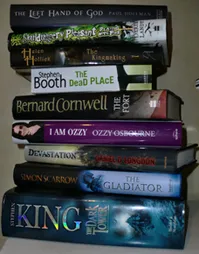
My Background:
I’m an Author.
I have five full novels, an anthology of short stories and a collection of seven short stories published, plus a number of stories and articles published in magazines and one multi-author anthology. UK US
I work as a professional Editor for a small Indie Publishing House.
I have a few years’ experience in publishing.
I was Editor in Chief of a large online magazine (approx. 100,000 hits per month at its peak).
My second novel, Cruel and Unusual was entered for The Orange Prize For Fiction in 2012.
I’ve written screenplays for movies and at least one of my stories has been made into a film.
I have a page on IMDB.
I've been asked for the links to my books. If you click the green text in the background blurb above, you'll get to the links.
If you'd like to see how I edited my own work, here's the link to Daughters of Le Fey![] the story has been left for a number of years and I show what I do, with descriptions and comparisons for you to see.
Pictures either with permission or from Google free to use image search
Writing a book is easy...
I can tell you how I write a book. I can tell you how other people write their books, that’s easy, it’s researchable – anyone can find that information. I think the reason you’re reading this is because you want to learn how YOU write a book.
I’m going to try to help you with that.
One tip I find invaluable - and I see a lot of newbies falling foul of it - READ everything you are preparing to comment on. It's no good reading just the first line, then flicking down through the post because you can't be bothered to read, barely taking time to note the pictures of course, because they always have something to do with the text, and then assuming you know what's been written because that's how you would have written it. It doesn't work and you'll get found out. Trust me.
Remember that rewrite?
And that next one?
You’ve finished them both and you’re happy with what you’ve got?
Buckle-up, Buttercup, we’re in for a bumpy ride!
“Write Drunk; Edit Sober”
– Ernest Hemingway
When you’re writing you’re in the creative zone. Pulling out fantasies of your imagination’s making and getting them down on paper. It’s satisfying and energising and a thoroughly wonderful experience if it catches you just right.

Now you need to swap that hat for another one. This new hat isn’t as floppy and comfortable as the creative one. This new hat is tight, rigid, and you need to be prepared for what it brings with it.
Put on your Editor’s hat.
Place your finger over the Delete button because you’re going to use it – a LOT more than you ever imagined.

Remember when you went off into that beautiful world of your own creation, tripped the light fantastic through the brilliant posies of prose and literary delight? You’re going to hack them down like weeds in the field.

The word you just couldn’t quite grasp until you searched through every page in the online thesaurus? Nope… delete, delete, delete!
Purple prose, long-winded descriptions of things that were never again seen in your story? You don’t need them, they’re deleted!
Sorry about that.
Chop out the Adverbs
Stephen King – love him or loathe him, he knows his stuff. He advocates that you lose as many adverbs (ly words) as you can.
Dan walked stealthily to where Daisy stood quietly. She didn’t hear him until he took her shoulders and shook her boisterously, making her gasp and turn around angrily.
Lazy writing may get you to the end of the story, but think about it. Do you want your readers to get to the end of your story quickly and unsatisfactorily? Or do you want them to remember your book as a tale you wove with passion, delight, humour, and a wistfulness that it’s come to an end which brings with it - “Oh and by the way, where can I get your next book? Is it out yet?”
Dan crept towards Daisy, she stood looking over the river, lost in her thoughts. She didn’t hear him as he approached and he took her shoulders and shook her with a playful laugh, expecting her to be as amused as he was. Daisy gasped, half-slipped on the muddy bank and turned around to glare at him. He took a surprised step back, hands in the air in a ‘please don’t hurt me’ pose, eyebrows lifted high in shock at her reaction and how the prank had misfired.
Not only do you get more description, a more engaging story, you also get more words to play with – words that are all necessary and won’t be deleted as you edit. Win-win!
Make good use of the Synonyms
You can be very tired with all of this work I’m making you do on your manuscript – or you could be exhausted.
You can be very upset that you have to lose all those lovely words that are unnecessary – or you could be devastated.
This is where the tight and rigid Editor’s hat comes into its own. Take out everything non-essential to the story. Do you need to describe that cat your character passed on the way to confront his enemy? Do you really? Why is that? Is it because you like cats or because you like how you captured the cat’s very essence, the way light glinted off its fur as it sat in the street, ignoring your proximity with the air of nonchalance seen only in cats and hitmen? When does that cat reappear in the story, because if it’s never seen again, you don’t need it. Don’t waste time describing things you don’t need.

This is a whole different cat!
Don’t show the gun unless it’s going to be fired.
The reason I advise you to do the first edit yourself is because I see a few manuscripts that really should have been read, re-read and at least rewritten before the manuscript got to me (the editor).
How many months have you worked very hard… sorry… toiled on this manuscript? And now, now you can see the finishing line very close… sorry within spitting distance, you want to sack it off and give it to an Editor?
Do YOURSELF a favour, as well as your manuscript, and do this work YOURSELF!
An Editor’s job is to polish the work to perfection, but first, the work has to be sound.
Liken this process to a renovation project. A car, lovingly rebuilt sent to the body shop for the final polish. You’ve put the paint on and the Editor is going to polish the paintwork.
Do you really want the Editor to have to patch-up the paint? Trust me, YOU have the right colour paint, the Editor has a similar shade and if the Editor has to patch-in any of the colour, you’re going to notice. Maybe your readers won’t, but you will.
Give your Editor as little to do on your book as you possibly can and everyone will thank you for it.